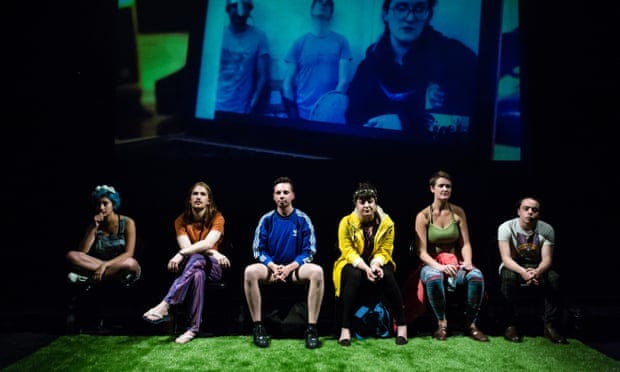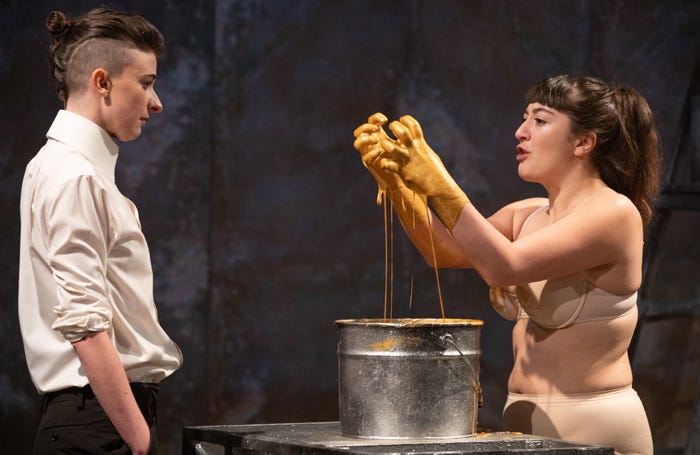Billy Barrett - co-artistic director, Breach Theatre
The company behind It's True, It's True, It's True have big plans.
Hello there…
How’s it going? Hope you’ve had a good week and have something nice planned over the weekend. I’ll be sat on the sofa watching the golf myself, because I recently turned 60.
Anyway, welcome to eighth issue of The Crush Bar, my fortnightly newsletter about theatre and the people that make it. If you haven’t subscribed already then please…
Below is an interview with Billy Barrett of Breach Theatre - the innovative, imaginative group behind It’s True, It’s True, It’s True, among other shows. We chatted for an hour or so earlier this week, and I found it really fascinating to hear about the company, its approach to making work, and its plans for the future. Hope you do, too.
Before that, if you could give this newsletter a quick share - tweet about it, forward it to someone - that’d be ace. I’ll see you at the bottom…
Interview: Billy Barrett
The seventeenth-century trial of Agostino Tassi for the rape of Italian artist Artemisia Gentileschi. A 1965 attempt to teach a dolphin called Peter to speak English. A 1985 conflict between Wiltshire Police and a band of New Age travellers near Stonehenge. What do all these things have in common?
Answer: they have all been the basis of shows by Breach, the devised theatre company that specialises in taking obscure historical events and turning them into deconstructed docu-dramas that are as interesting as they are innovatively staged.
“The Guardian,” says co-artistic director Billy Barrett, when asked where the company gets its ideas from. “We have gone actively looking for stuff in the past, but I don’t think we’ve ever actually had much success doing that. It has always been things that have jumped out at us when we haven’t been looking. And, mostly, that’s been articles in The Guardian.”
“We didn’t know what the outcome was going to be. We just had a group of actors and a wild idea…”
Whatever method Breach has been using to find ideas, it is working. Since the company made its debut in 2015 with The Beanfield – a prescient, hour-long exploration of the brutal 1985 confrontation between Margaret Thatcher’s police and several hundred Stonehenge Free Festival-goers – it has chalked up hit fringe show after hit fringe show.
“We wanted to make a multimedia piece that was also an attempt to re-create a politically contentious event,” says Barrett of The Beanfield. “We didn’t know what the outcome was going to be. We just had a group of actors and a wild idea and documented everything. We discovered what the final show would look like through that process.”
That first show was made while Barrett and his co-creators were final-year students at Warwick University, and it brought together core team that have been behind Breach ever since. There’s Barrett, who mostly writes and directs. There’s Ellice Stevens, who writes and acts. And there’s video-artist and dramaturg Dorothy Allen-Pickard, who does a bit of everything. In 2017, the trio were joined by producer Ellie Claughton.
Although the company has evolved a long way since The Beanfield, much of what it has become known for was already there are the beginning – the obscure inspiration, the devising approach, the use of multimedia, and the willingness to let subjectivity in.
“The Beanfield was definitely, perhaps unintentionally, a statement of intent in terms of our politics and our approach to form,” says Barrett. “We picked a side. We weren’t trying to be balanced.”
“Now we have fallen into this form of theatre – documentary theatre, documentary-ish theatre, post-documentary theatre, whatever you want to call it – and we don’t see it as a way of telling objective truth,” he continues. “We see it as something that can hold complexity, and different versions of the truth, and that allows us to foreground ourselves as makers within it.”
Barrett was born in London in 1992. He went to the theatre regularly as a child but his own approach to making work is rooted in the experiences he had while studying drama at school.
“It sounds basic, but I always really enjoyed the way that you make shows in A-Level drama,” he says. “You get put in groups, you come up with an idea, and you make a show collaboratively. And I don’t think I’ve ever really changed.”
Despite that interest in devised theatre, though, Barrett started studying English and French when he arrived at Warwick University. In his second year he switched to an English and Drama degree, but it was still some time before he seriously considered theatre-making as a career.
“For quite a while, I was more interested in criticism – in reviewing and feature-writing,” he says. “I reviewed for The Scotsman at the Edinburgh Fringe. I reviewed for A Younger Theatre. I wrote for Noises Off at the National Student Drama Festival. I thought that’s what I was going to do, until we made The Beanfield.”
“Things just change when you seriously start to try and make a career in theatre…”
The success of that show – Lyn Gardner called it “theatrically ambitious and boldly political” -changed everything. Breach followed it with a second show, Tank, in 2016 – that’s the one about American scientists trying to teach dolphins English – and a third, The Drill, in 2018. Along the way, says Barrett, the company learned some hard lessons.
“Our roles used to overlap a lot,” says Barrett. “Probably too much. We really struggled when we used to co-direct things. Now, we have more defined roles. And we know that just because someone has the creative lead on something, it doesn’t mean they are more important, and it doesn’t necessarily go against our politics. It was actually quite liberating when we discovered that.”
“We saw The Beanfield as a piece of activism as much as a piece of art, and I think we have inevitably lost some of that radicalism since,” he adds. “But things just change when you seriously start to try and make a career in theatre. You have to operate within certain rules to get funding, and you need people to actually come and watch it, too. Hopefully we still have a shred of radicalism, though.”
If it took several shows for Breach’s core team to work out how they wanted to make work, they had certainly done so by the time they made their fourth show – the one about the artist Artemisia Gentileschi, and the trial of Agostino Tassi.
“That one came from a Jonathan Jones article about an exhibition at the National Gallery called Beyond Caravaggio,” says Barrett. “He mentioned the existence of the court transcripts from the trial. I did some research and realised no one had really done a play about them. Ellice had been wanting to do an all-female show for a while, too. So, we kind of meshed those two ideas together.”
The end result – after a week of R&D, a period of editing and writing, and several weeks of devising with regular collaborators Sophie Steer and Harriet Webb – was It’s True, It’s True, It’s True, which Breach took to the Edinburgh Fringe in 2018. It immediately struck a chord – particularly in the way its centuries-old story of sexual assault provided a chilling historical parallel to the #MeToo movement, which had erupted earlier that year.
“The process of making it was so quick, that you don’t always know what it looks like until the other side,” says Barrett, who co-wrote and directed the show. “Until the final few days, everything can look a bit of a mess. But in Edinburgh, we quickly saw people were really responding to it. We saw people were connecting with it. We saw it was doing something special.”
“It was amazing, but it was intense. You make a show about those experiences, you open yourself up to difficult emotions and difficult conversations…”
It’s True, It’s True, It’s True marked a step up for Breach. The show won several awards, transferred to – where else? – London’s New Diorama Theatre, before returning to Edinburgh in 2019, then embarking on a national tour. A filmed version, produced with Artemisia Films, was broadcast on BBC4 in February 2020, then streamed on YouTube to coincide with the National Gallery’s blockbuster exhibition on Gentileschi. Another London run, at the Barbican, was slated for April 2020, but was postponed due to coronavirus. So, too, were planned trips to New York and Portugal.
“It was amazing, but it was intense,” says Barrett of the show’s extraordinary journey. “You make a show about those experiences, you open yourself up to difficult emotions and difficult conversations, and with that come responsibilities. One of the things I’m most proud of is that, wherever we went in the UK, we partnered with a different sexual violence support organisation, so the audience would have someone to offer support after the show.”
Breach had time to squeeze in one more show before the pandemic hit. It was called Joan Of Leeds, it was the New Diorama Theatre’s Christmas show, and it was a musical, developed with James Frewer of Middle Child Theatre and inspired by the medieval story of a runaway nun who faked her own death to escape a convent. The company made it, says Barrett, to see if they could be serious as well as silly. Of course, it was based on a newspaper article.
Breach are now an associate ensemble at the New Diorama Theatre, and the company’s core team – Barrett, Stevens and Allen-Pickard - have been making shows together for six years. They are wary, says Barrett, of losing their individual artistic identities to the company.
It is part of the reason the three of them make work outside Breach. Stevens has acted in other projects, Allen-Pickard has made several short films, and Barrett completed an MA in Theatre and Performance at Queen Mary University before directing several other shows, including Tabby Lamb’s Since U Been Gone at the 2019 Edinburgh Fringe.
“I think it is about finding a balance,” he says. “I think it is healthy for us to go off and do individual projects because we mature as artists and bring that knowledge back to the company. But I also know that the company is at a stage now that we can have an idea, get it funded, and get it programmed, and that I don’t have that power as an individual.”
Breach’s latest show, Jackal Run, is the biggest the company has made to date. Devised with fifteen final-year acting students at Guildhall School of Music and Drama, it is “a hybrid between stage play and TV drama” that will be available to watch online on Wednesday.
After Joan of Leeds, the company are back to their serious selves – Jackal Run is about undercover policing, and the way officers infiltrate their way into protest groups, and into the lives of those that are part of them. A public inquiry into the practice is currently ongoing, so Barrett is cagey about saying too much.
“The show is about the psychological impact of being spied on by undercover police, by someone you have formed a friendship or a sexual relationship with,” says Barrett. “We’ve had some conversations with people that were spied on, we’ve done our own research, and we’ve taken some material verbatim from the ongoing inquiry.”
“I would hope that we are on a similar timeline to companies like Forced Entertainment or Complicité…”
The show also represents the chance for Barrett and for Breach to start figuring some things out about the future. The company are keen to start working “with bigger casts and bigger production values”, and Jackal Run represents the perfect opportunity to discover what devising theatre at that level looks like.
“We are keen to scale up at some point,” Barrett says. “Our ambition is to work on a larger scale, with bigger casts and bigger production values. It will be interesting to see what impact that has on our approach. I hope we manage to find a balance between doing stuff that is more conventional and commercial, and holding onto our style, our aesthetic and our politics.”
“I would hope that we are on a similar timeline to companies like Forced Entertainment or Complicité,” he concludes. “I would love for us to collaborate for decades and have a collective voice that matures over time.”
“The most helpful thing someone could do for me is…”
Get in touch if you're after a director on a project. I've mostly lead devising processes but at the moment I'm also really keen to direct more new plays by great writers.
Help shift the institutional culture of UK theatres towards developing and programming companies, not just individual playwrights and directors.
Tell me what to do on the first day of rehearsals.
“If you want to get an idea of what I do…”
Watch work by other theatre companies and artists around my age/career level/scale. I love noticing echoes, responses and developments on ideas across different shows. We're all in conversation with each other and that's a brilliant thing.
You can listen to the soundtrack of our Christmas show Joan of Leeds on Spotify, by musical director James Frewer and sound designer Owen Crouch. It's a ridiculous musical we made in three weeks and makes me miss live theatre very much.
In terms of inspirations, the big one I always come back to is Jeremy Deller's The Battle of Orgreave - it was a big influence on The Beanfield and I think continues to shape how we approach ideas around history, identity, performance and narrative.
Bits and bobs, shouts and murmurs…
This is a list of what other interviewees are up to over the next few weeks. Read their interviews! Give them a follow! Buy a ticket to see their stuff!
Last issue’s interviewee, the playwright Nina Segal, is one of the writers on the Royal Court’s next edition of Living Newspaper, which starts streaming next week. You can read my interview with Nina here, and you can book a ticket to see the various bits and bobs that make up Living Newspaper here.
Alice Boyd - interviewee number two - and her theatre company Poltergeist are adapting their show Lights Over Tesco Car Park into a 360-degree VR experience with Battersea Arts Centre! It starts in May and you can book now.
And Grace Gallagher - interviewee number one - and her clowning company Ugly Bucket Theatre are performing their new show Good Grief at Liverpool’s Unity Theatre in July. Live! With an audience! Also online! You can book here.
On Sunday evening, interviewee number six - the actor, singer and songwriter Maimuna Memon - is in Welcome To Iran, a play by Nadia Fall that was supposed to open at Theatre Royal Stratford East last year, but has been adapted into a BBC radio play instead.
Lewis Doherty - interviewee number four - is performing his one-man show Boar at Nottingham Playhouse on May 27th and you can watch it in-person or online. He’s also got a new one-man audio series, The Book Of Skadi, that is available to listen to now!
And, last of all, the next new play in Sound Stage - the audio series produced by the Edinburgh Lyceum and Pitlochry Festival Theatre - is John Byrne’s Tennis Elbow. It’s directed by Elizabeth Newman, interviewee number five, and it will be available to listen to from April 30th.
See ya…
Thanks for reading. Thanks for subscribing. Thanks for sharing. Your next issue will be along in a fortnight’s time, and it is going to feature an interview with the actor William Grint, star of Ramps On The Moon’s production of The Who’s Tommy, who is about to make his debut at the RSC.
If you want to contact me before then, you can just reply to this email, or contact me on Twitter - I’m @FergusMorgan. Right. That’s that. Back to the golf. See you in a couple of weeks.
Fergus x






